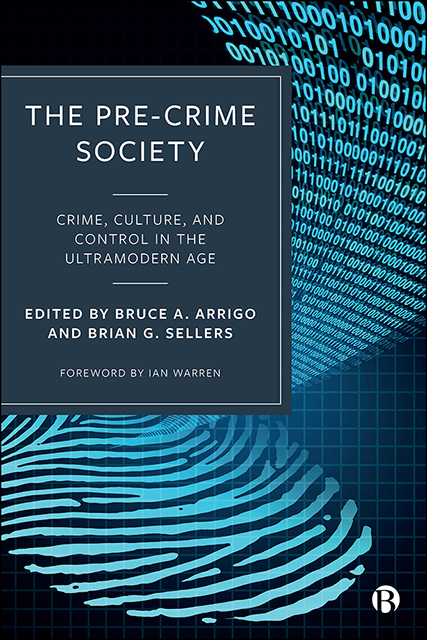Book contents
- Frontmatter
- Dedication
- Contents
- Notes on Contributors
- Foreword
- Introduction: The Ultramodern Age of Criminology, Control Societies and ‘Dividual’ Justice Policy
- Part I Theories, Theorists and Theoretical Perspectives
- Part II Institutions, Organizations and the Surveillance Industrial Complex
- Part III Dataveillance, Governance and Policing Control Societies
- Part IV Systems of Surveillance, Discipline and the New Penology
- Part V Globalizing Surveillance, Human Rights and (In)Security
- Afterword: ‘Pre-Crime’ Technologies and the Myth of Race Neutrality
- Index
17 - Surveilling the Civil Death of the Criminal Class
Published online by Cambridge University Press: 14 April 2023
- Frontmatter
- Dedication
- Contents
- Notes on Contributors
- Foreword
- Introduction: The Ultramodern Age of Criminology, Control Societies and ‘Dividual’ Justice Policy
- Part I Theories, Theorists and Theoretical Perspectives
- Part II Institutions, Organizations and the Surveillance Industrial Complex
- Part III Dataveillance, Governance and Policing Control Societies
- Part IV Systems of Surveillance, Discipline and the New Penology
- Part V Globalizing Surveillance, Human Rights and (In)Security
- Afterword: ‘Pre-Crime’ Technologies and the Myth of Race Neutrality
- Index
Summary
Introduction
Judge Henry Wingate explained the importance of the right to vote and the use of disenfranchisement as a form of punishment as follows:
Disenfranchisement is the harshest civil sanction imposed by a democratic society. When brought beneath its axe, the disenfranchised is severed from the body politic and condemned to the lowest form of citizenship, where voiceless at the ballot box … the disinherited must sit idly by while others elect his civic leaders and while others choose the fiscal and governmental policies which will govern him and his family. Such a shadowy form of citizenship must not be imposed lightly. (Shapiro, 2001)
In the liberal democracies of late capitalism, being a citizen without the right to self-representation through voting is akin to civil death (Miller & Spillane, 2012). This medieval concept describes the banishment of the convicted from the umbrella of the state—a punishment reserved for only the most heinous crimes (Agamben, 1998; Miller & Spillane, 2012). Civil death resulted in outlaw status, and left the indicted a political non-entity, both unprotected by systems of law and unrepresented in legislative structures (Agamben, 1998). Yet judicial decisions have confirmed that citizenship does not necessarily include the right to vote; rather states can decide who has that right (Schultz, 2007).
In the United States today, varying state-level practices of disenfranchising the incarcerated, those on parole or probation, those still paying court fines or fees, and those who have completed carceral sentences mean that approximately 6.1 million American citizens cannot legally vote (The Sentencing Project, 2016). Without the ability to vote, those who have had experiences with the criminal justice system cannot participate in the democratic conversation about crime and crime control. More broadly, because carceral systems of enforcement fall disproportionately heavily on racialized and impoverished citizens, electoral exclusion falls disproportionately on their communities (Behrens, Uggen & Manza, 2003; Cammett, 2012).
Voting matters. It converts people from governed subjects to citizen governors. At the level of the community, it makes claims-making on the state possible and elected officials accountable to community needs (Dunning, 2011). The increasingly ubiquitous surveillance of voters means that candidates choose platforms in tandem with voter preferences (Bennett, 2015). With those with felony convictions excluded, a feedback loop of criminalization is inevitable.
Thus, the inescapable underlying logic of felon disenfranchisement is one of pre-crime.
- Type
- Chapter
- Information
- The Pre-Crime SocietyCrime, Culture and Control in the Ultramodern Age, pp. 389 - 408Publisher: Bristol University PressPrint publication year: 2021

